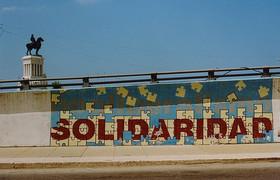One of the entertaining characteristics of Ronald Reagan’s first cabinet was that most of its members wore a tie bearing a cameo profile of Adam Smith. The new team had a clear vision: it was time to replace the statist capitalism theorized by John Maynard Keynes with the free market capitalism espoused by An Inquiry into the Nature and Causes of the Wealth of Nations. Smith’s disciples launched what Ecuador’s current President Rafael Correa has called “the long night of neo-liberalism.” Neo-liberalism, with its deregulation and financial engineering, was supposed to provide society with better economic risk management: the free-market philosophy promised us that unfettered markets were more efficient than statist forms of regulation. If the markets made mistakes they could also quickly correct them thus ending the fluctuations of the business cycle and therefore produce a more reliable climate for investment.
In fact the opposite occurred. Since the East Asian currency calamity of 1997 we have witnessed repeated crises and bailouts: Thailand, Korea, Indonesia, Mexico, Brazil, Argentina, and Russia. After each case we witnessed a return to business and thinking as usual, that is, a resumption of the faith in the free market. The 2008 financial crisis finally extinguished our generation’s most influential post-Cold War illusion. The long night is now surely — albeit slowly — coming to a close.
The question of course concerns the dawn that lies ahead: what will replace the “Washington Consensus” that has ruled national and global economic policy since 1980? Because of the Great Recession, policymakers, academics and activists are now paying more attention to alternative economic models. Two relatively new Latin American proposals for moving from free markets to fair markets are the Bolivarian Alliance for the Americas (ALBA) and the Bank of the South.
ALBA began as a bilateral accord signed by Venezuela and Cuba in 2004. Since then it has expanded to also include Nicaragua, Bolivia, Ecuador, Saint Vincent and Grenadines, Dominica, Antigua and Barbuda. Against the standard free trade model of deregulated competition, ALBA proposes a system based on complementarity that emphasizes combining national advantages in a way that produces greater social justice. An example of this type of agreement is the specific pact between Cuba and Venezuela in which the former has sent 30,000 doctors and medical support staff in return for inexpensive, stable oil supplies from the latter. This fair trade agreement allows each member to rely on its export strengths via a method that intentionally fulfills the needs of its partners.
Along with rethinking free trade there has also been a re-examination of lending practices. Over the past decade the International Monetary Fund (IMF) has lost influence over middle-income Latin American countries — that is, leftist-led Latin American countries have refused to sign new agreements to borrow money from the Fund. From 2003 to 2007, the IMF’s lending to Latin America and the Caribbean fell from $49 billion to $701 million dollars. Since the financial crisis, the IMF’s loans increased to only $1.31 billion dollars. Instead of relying on the neoliberal policies that shape the IMF, middle-income countries have looked to other solutions. In 2007, Venezuela, Brazil, Argentina, Bolivia, Ecuador, Uruguay and Paraguay inaugurated the Bank of the South with the mission of focusing on regional integration and poverty alleviation. The Bank has been slow to get started — partially because of the 2008 crisis — but it currently has 20 billion dollars in pledges from its member countries.
Both of these alternatives, ALBA and the Bank of the South, represent innovative responses to a dying neo-liberalism. Both are attempts at forging a “Latin American Consensus,” an anti-imperial alternative modernity, against the failed free market once propelled by Washington. These proposals are innovative but they share a common flaw with the acolytes of Adam Smith. Like the neo-liberals that they oppose, Latin America’s progressives also are deeply dependent on one pillar. Both ALBA and the Bank of the South were politically, economically and personally instigated by the Venezuelan government and its charismatic President Hugo Chávez. While Chávez’s policies may produce less inequality than those of his adversaries, and his red beret may inspire more activists than a tie emblazoned with Adam Smith’s profile, the dependence on one person’s thought or initiative is a challenge that progressives must eventually transcend. In the meantime, Latin America continues to build institutional alternatives that are reshaping economies across the continent.
Thomas Ponniah was a Lecturer on Social Studies and Assistant Director of Studies at Harvard University from 2003-2011. He remains an affiliate of Harvard’s David Rockefeller Center for Latin American Studies and an Associate of the Department of African and African-American Studies.




